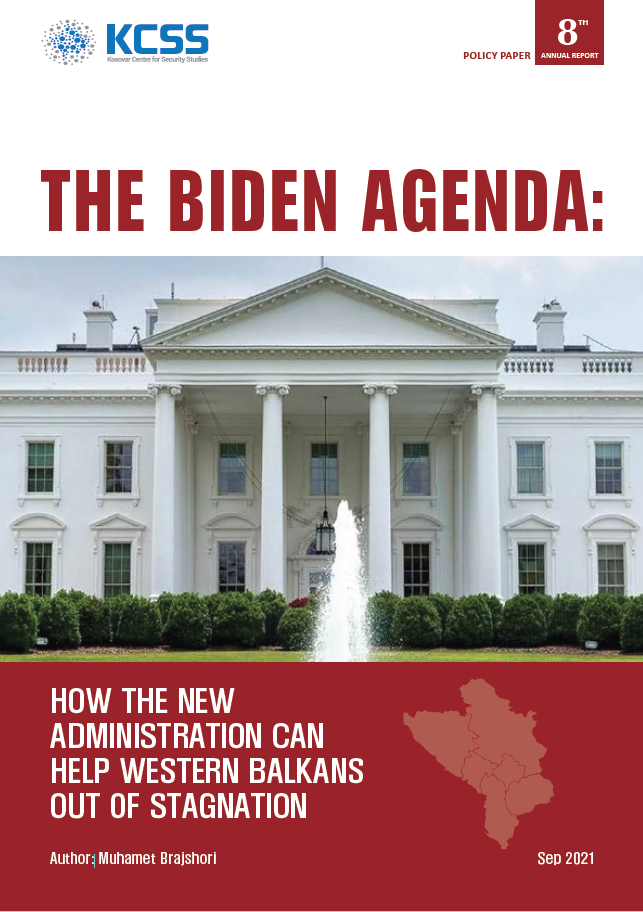1/09/2021

Kosovar Center for Security Studies (KCSS)
Qendra Kosovare për Studime të Sigurisë (QKSS)
Muhamet Brajshori
President Biden’s administration has shown signs of seeking to focus in the region by having a nor-mative-based policy in place to addresses issues that empower the region and help the region by undertaking reforms and making progress on Euro-Atlantic integration. One of the main aspects of this re-engagement will be the sensitive political issues that hold the region in deadlocks, such as the complicated relations between Kosovo and Serbia, and the risk that Bosnia and Herzegovina will turn into a totally failed state in the heart of Europe. A key element of Washington’s engagement will be closer coordination with European allies to complete the remaining open issues in the Western Balkans. But the challenges are immense and the expectations are high.
Kosovo and Serbia are far from normalizing relations and the status quo is holding both societies hostage making them unable to make progress towards European integration; Bosnia still fails to have a functioning state, while the region is experiencing a major Chinese penetration that will challenge the US and the EU mainly in countries that are undergoing democratic recession such as Serbia. These and many other issues such as the pandemic, energy security, and democratization will require strategic clarity from Washington and a determination to make progress. Bringing the region back on track in the democratization, rule of law, and EU enlargement prospects would require the involvement of the US administration.
The fundamental challenge for durable peace and stability in the Western Balkans is risking Kosovo and Bosnia and Herzegovina to become frozen conflicts. If both countries can resolve their bilateral and internal challenges respectively, the region has a higher chance to move forward in the path of cooperation and European integration. However, if the sensitive political issues that characterize both countries turn into frozen conflicts, there is an opportunity for malign actors to become more active and present in the region than they currently have.
On the other hand, no matter how complicated the situation may seem, it is not an impossible mission to make progress in the region. Progress can be made in fighting corruption, economic development, and strengthening democracy, which can have a significant impact on addressing political issues. At the same time, greater pressure is required from Washington on the European Union to unblock the European integration process towards the Western Balkans, otherwise, any US effort in the region will not be effective if the integration process remains blocked due to the EU. Reform, progress toward EU integration, and American engagement should be seen as an interconnected cycle, not as separate issues.
The new Biden administration has a lot of work to do in the Western Balkans. Challenges are many, but the key to overcoming them, at least from the perspective of the region seems to be the political will in Washington to truly engage with the issues and move the countries towards the EU or even NATO integration for those who have this goal. The potential complacency with the situation in the Western Balkan in the Biden administration can exacerbate the prospects for a frozen conflict in Kosovo and BiH and at the same time, a crucial test will be for the Administration to manage the expectations inside and outside of Western Balkans. Adaptation to the current circumstances in the region is a necessity to address the political, economic or security challenges more effectively than what has happened in the last 4 years.